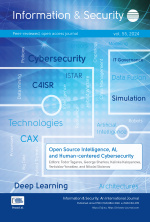National Cyber Security Strategy and the Emergence of Strong Digital Borders
Source:
Connections: The Quarterly Journal,Abstract:
The growth of the Internet and innovation that thrived with it was facilitated by an environment relatively free of controls. Regrettably, however, with its deep integration into the societal framework, the Internet has become a potent tool for influencing geopolitical conflicts, including interference in internal affairs of other nations, undermining national security, destabilizing financial infrastructure, and attacks on critical infrastructure. While countries are harvesting the social and economic benefits of the Internet, they are frightened of the threats it poses to national security. In response to these threats, countries are starting to tighten their internet borders and developing their cyber weaponry both as a deterrent to, and leverage during conflicts. A potential downside of such state-by-state regulation is inhibition of the rapid innovation that the Internet has traditionally fostered and the curtailing of freedom of speech that has led to the social integration in the society. On the other hand, innovation and freedom cannot thrive in a chaotic environment with rampant crime and a lack of rules, norms, and ethics. With this in mind, national policymakers face the challenge of striking a balance between regulation and potential chaos on the Internet while at the same time promoting freedom. In efforts to strike such a balance of national interests, borders in cyberspace have an important role to play along with international efforts to build trust in cyberspace and to slow down the fragmentation of the Internet. This article discusses how cyber conflicts are escalating, how mutual distrust is growing, and how nation-states are adapting to the constantly changing cyber domain.
